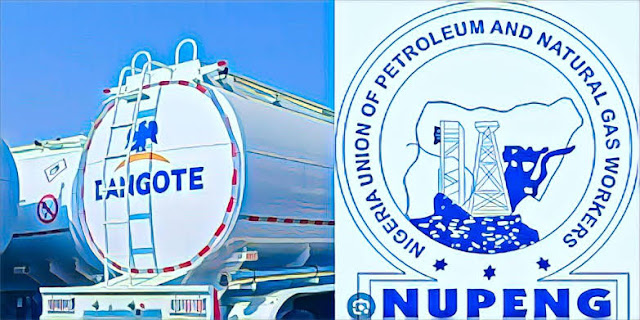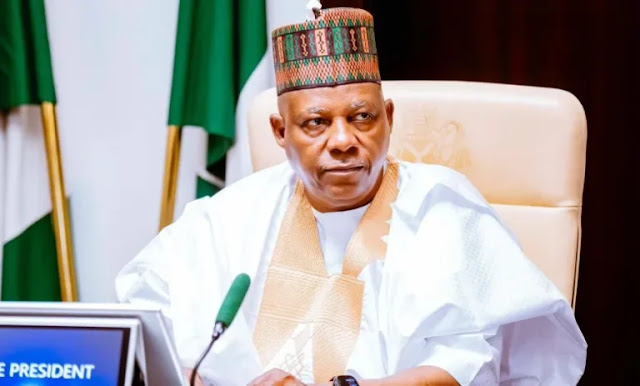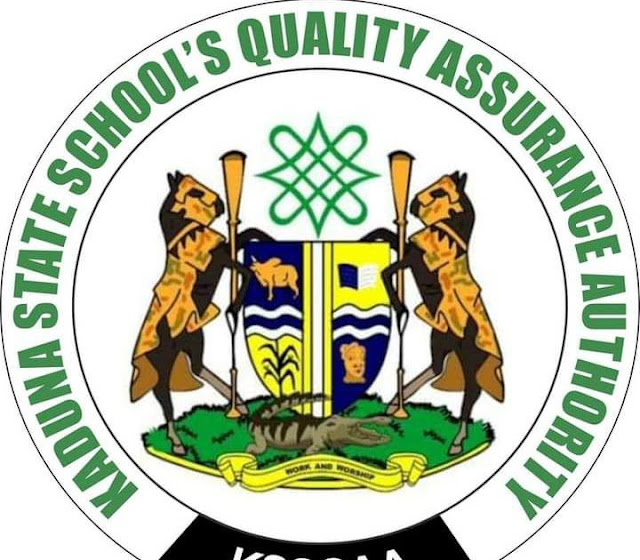In a significant development for Nigeria’s oil and gas sector, the Nigeria Union of Petroleum and Natural Gas Workers (NUPENG) announced the suspension of its nationwide strike on Tuesday, September 9, 2025. The decision came after intense negotiations with the management of the Dangote Group, facilitated by high-level government intervention, including the Department of State Services (DSS) and key federal ministries. The strike, which had disrupted fuel distribution across the country, was initially launched to protest the Dangote Group’s alleged refusal to allow its workers to join NUPENG, a move the union described as an anti-labor practice. This resolution marks a critical moment in Nigeria’s ongoing struggle to balance industrial relations, economic stability, and workers’ rights in one of its most vital industries.
Background of the NUPENG-Dangote Dispute
The Nigeria Union of Petroleum and Natural Gas Workers (NUPENG) is one of Nigeria’s most influential labor unions, representing workers across the oil and gas value chain, including those involved in fuel distribution, refinery operations, and petrochemical production. With a membership base spanning thousands of workers, NUPENG wields significant influence, capable of disrupting the nation’s energy supply chain when industrial action is taken. The union’s role in advocating for workers’ rights has often placed it at odds with major industry players, including multinational corporations and local conglomerates like the Dangote Group.
The Dangote Group, led by Africa’s richest man, Aliko Dangote, is a cornerstone of Nigeria’s industrial landscape. Its flagship project, the Dangote Refinery and Petrochemicals complex in Lagos, is one of the largest single-train refineries in the world, with a capacity to process 650,000 barrels of crude oil per day. The refinery is seen as a game-changer for Nigeria’s energy sector, promising to reduce the country’s reliance on imported fuel and bolster its economy. However, the project has not been without controversy, with allegations of labor rights violations surfacing in recent years.
The dispute between NUPENG and the Dangote Group centered on the company’s alleged refusal to allow its workers to join the union, a right enshrined in Nigeria’s labor laws. NUPENG argued that the Dangote Group’s anti-union stance violated the principles of freedom of association and collective bargaining, which are guaranteed under the Nigerian Constitution and international labor conventions. The union accused the company of intimidating workers who sought to unionize, creating a climate of fear and undermining their rights.
On Monday, September 8, 2025, NUPENG declared a nationwide strike, directing its members to halt the loading and distribution of petroleum products across the country. The action led to widespread fuel shortages, with many filling stations closing their pumps and long queues forming at those that remained operational. The strike’s immediate impact underscored the critical role of NUPENG members in Nigeria’s energy supply chain and highlighted the potential for labor disputes to destabilize the economy.
The Strike and Its Immediate Impact
The decision to embark on a nationwide strike was not taken lightly by NUPENG. The union had issued prior warnings to the Dangote Group, urging the company to reconsider its stance on unionization. However, when these efforts failed to yield results, NUPENG escalated its response, mobilizing its members for industrial action. The strike, which began on September 8, 2025, disrupted fuel distribution across major cities, including Lagos, Abuja, and Port Harcourt, leading to significant inconvenience for motorists and businesses.
The timing of the strike was particularly sensitive, as Nigeria was already grappling with economic challenges, including high inflation, a weakening naira, and rising fuel prices following the removal of fuel subsidies. The disruption in fuel supply exacerbated these issues, with black-market fuel vendors capitalizing on the scarcity to sell petrol at exorbitant prices. Businesses reliant on fuel, such as transportation and manufacturing, reported significant losses, while ordinary Nigerians faced increased costs for goods and services.
Public reaction to the strike was mixed. While some Nigerians expressed solidarity with NUPENG, citing the importance of workers’ rights, others criticized the union for its timing, arguing that the strike added to the economic hardships already faced by citizens. Posts on X reflected this divide, with some users praising NUPENG’s resolve to protect workers’ rights, while others accused the union of holding the nation hostage over a private company’s policies.
Government Intervention and Negotiations
The rapid escalation of the strike prompted swift intervention from the federal government, which recognized the potential for widespread economic disruption. The Department of State Services (DSS) convened an emergency meeting on Tuesday, September 9, 2025, bringing together representatives from NUPENG, the Dangote Group, and key government officials. The meeting included the Ministers of Labour and Employment, Finance, and officials from the Nigerian Midstream and Downstream Petroleum Regulatory Authority (NMDPRA). Seyu Dantata, a senior executive of the Dangote Group, led the company’s delegation to the talks.
The negotiations were described as intense but productive, with both sides presenting their grievances and demands. NUPENG reiterated its call for the Dangote Group to respect workers’ rights to unionize, while the company maintained that it had not explicitly barred unionization but was concerned about operational disruptions. The government, acting as a mediator, emphasized the need for a resolution that would prevent further economic damage and ensure stability in the oil and gas sector.
After hours of deliberation, the parties reached an agreement, culminating in the signing of a Memorandum of Understanding (MoU). The MoU outlined several key concessions, including the Dangote Group’s commitment to allow workers who wished to join NUPENG to do so without fear of victimization. The agreement also stipulated that the unionization process would commence immediately and be completed within a two-week period, from September 9 to September 22, 2025. Additionally, the MoU ensured that no worker would face repercussions for participating in the strike, addressing concerns about potential retaliatory measures by the company.
Details of the Memorandum of Understanding
The MoU signed between NUPENG and the Dangote Group was a critical step in resolving the dispute. Key provisions included:
Unionization Rights: The Dangote Group agreed to recognize the right of its employees to join NUPENG or any other recognized labor union, in line with Nigeria’s labor laws and international conventions. This was a significant victory for NUPENG, which had framed the dispute as a matter of principle.
Timeline for Implementation: The unionization process was to be initiated immediately, with a two-week timeline for completion. This ensured that workers could begin organizing without further delay.
Non-Victimization Clause: The MoU explicitly stated that no employee of the Dangote Refinery and Petrochemicals would face victimization or disciplinary action for participating in the strike or seeking to unionize. This provision addressed fears of reprisals, which had been a major concern for workers.
Exclusivity of Unionization: The agreement clarified that the Dangote Group would not establish a rival union to undermine NUPENG’s efforts, ensuring that workers could freely choose their representation.
The signing of the MoU was hailed as a triumph of dialogue and negotiation, with both NUPENG and the Dangote Group expressing satisfaction with the outcome. The government’s role in facilitating the talks was also commended, with the DSS and the involved ministries praised for their proactive approach to resolving the crisis.
Broader Implications for Nigeria’s Oil and Gas Sector
The resolution of the NUPENG-Dangote dispute carries significant implications for Nigeria’s oil and gas industry, which is a cornerstone of the nation’s economy. The sector accounts for a substantial portion of Nigeria’s GDP and foreign exchange earnings, making stability in this industry a national priority. The strike, though brief, exposed vulnerabilities in the supply chain and highlighted the power of organized labor to influence economic outcomes.
The agreement also underscores the importance of labor rights in the context of Nigeria’s push for industrialization. The Dangote Refinery, billed as a symbol of Nigeria’s economic self-reliance, has been touted as a transformative project. However, its success depends not only on infrastructure and investment but also on the well-being of its workforce. By agreeing to unionization, the Dangote Group has taken a step toward aligning with global labor standards, which could enhance its reputation both domestically and internationally.
Furthermore, the resolution sets a precedent for how labor disputes in Nigeria’s private sector can be managed. The involvement of government agencies in mediating the conflict demonstrates the state’s role in balancing the interests of workers and employers. However, it also raises questions about the extent to which government intervention in private-sector disputes should be relied upon, particularly in an industry as critical as oil and gas.
The Role of Labor Unions in Nigeria
NUPENG’s actions in this dispute highlight the enduring influence of labor unions in Nigeria. Despite challenges such as declining membership in some sectors and accusations of politicization, unions like NUPENG and the Nigeria Labour Congress (NLC) remain powerful forces in advocating for workers’ rights. The NLC, in fact, had declared its solidarity with NUPENG during the strike, amplifying the pressure on the Dangote Group and the government to act swiftly.
Labor unions in Nigeria have a storied history, dating back to the colonial era when workers organized to demand better conditions and wages. In the post-independence period, unions have played a pivotal role in shaping labor policies and challenging government and corporate excesses. However, they have also faced criticism for actions perceived as disruptive, particularly when strikes lead to economic hardship for ordinary citizens.
The NUPENG-Dangote dispute illustrates both the strengths and challenges of union activism. On one hand, NUPENG’s ability to mobilize a nationwide strike demonstrated its organizational capacity and commitment to its members. On the other hand, the public backlash against the strike’s economic impact underscores the delicate balance unions must strike between advocating for workers and considering broader societal consequences.
Political and Social Context
The NUPENG strike and its resolution must also be viewed within Nigeria’s broader political and social context. The country is navigating a complex economic landscape, with the government’s removal of fuel subsidies leading to skyrocketing fuel prices and increased cost of living. This policy, introduced in 2023, has been a source of tension between the government and labor unions, with the latter accusing the state of neglecting workers’ welfare.
The Dangote Refinery, as a private-sector initiative, has been positioned as a solution to some of these economic challenges, particularly Nigeria’s dependence on imported fuel. However, the dispute with NUPENG highlights the tension between economic development goals and labor rights. For many Nigerians, the strike was a reminder of the need for inclusive growth that prioritizes workers alongside corporate interests.
Social media platforms, particularly X, played a significant role in shaping public discourse around the strike. Posts on X ranged from expressions of support for NUPENG’s fight for workers’ rights to criticisms of the strike’s timing and impact. One user, for instance, questioned the logic of a nationwide strike over a private company’s policies, arguing that legal action against the Dangote Group would have been a more targeted approach. Others celebrated the resolution, praising the government’s intervention and the Dangote Group’s willingness to compromise.
Looking Ahead
The suspension of the NUPENG strike marks a temporary reprieve for Nigeria’s oil and gas sector, but it also raises questions about the future of labor relations in the industry. The two-week timeline for implementing the MoU will be closely watched, with NUPENG likely to hold the Dangote Group accountable for fulfilling its commitments. Any failure to adhere to the agreement could reignite tensions, potentially leading to further industrial action.
For the Dangote Group, the resolution offers an opportunity to strengthen its relationship with its workforce and demonstrate its commitment to fair labor practices. The company’s ability to navigate this challenge will be critical to maintaining its reputation as a leading player in Africa’s industrial landscape.
For the Nigerian government, the successful mediation of the dispute highlights the importance of proactive engagement in resolving labor conflicts. However, it also underscores the need for systemic reforms to address recurring issues in the oil and gas sector, including wage disparities, job security, and workers’ rights.
Conclusion
The suspension of NUPENG’s nationwide strike on September 9, 2025, represents a significant milestone in Nigeria’s ongoing efforts to balance economic development with workers’ rights. The agreement reached with the Dangote Group, facilitated by government intervention, demonstrates the power of dialogue in resolving complex labor disputes. However, the episode also serves as a reminder of the challenges facing Nigeria’s oil and gas sector, where the interests of workers, corporations, and the public often collide.
As Nigeria continues its journey toward economic self-reliance, the lessons from this dispute will resonate far beyond the oil industry. The resolution underscores the importance of respecting workers’ rights, fostering inclusive growth, and ensuring that the benefits of industrialization are shared equitably. For NUPENG, the Dangote Group, and the Nigerian government, the path forward lies in building trust, promoting transparency, and working collaboratively to create a sustainable and prosperous future for all Nigerians.






